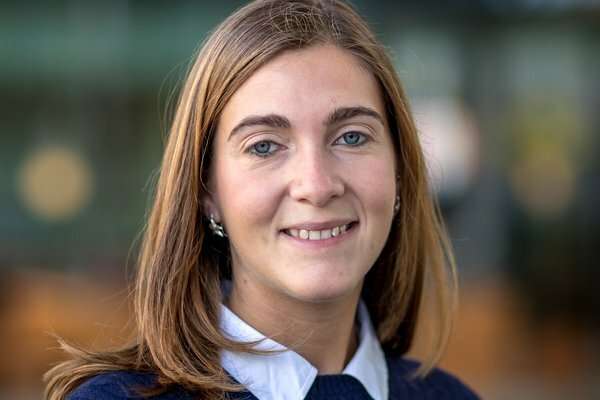Cecilia Bottecchia. Credit: Angeline Swinkels
Ph.D. candidate Cecilia Bottecchia was one of the first to succeed in converting amino acids, which can be used for medication, with the help of visible light. This is more sustainable than conventional methods, in which the conversion is powered by heating. She used photocatalysts to capture the light and to direct the energy to the desired chemical reactions. Bottecchia obtained her Ph.D. with distinction on 20 February.
The idea of using light to drive chemical reactions is not new. But for biomolecules, such as amino acids, it wasn't very suitable because most biomolecules only absorb UV light. Theoretically, UV light could be used, but UV lamps are unhealthy for people and are so energetic that they break down the molecules. So a method that works with visible light is very desirable.
Bottecchia was able to realize this, not only by designing the right photocatalytic molecules, but also the corresponding reactors. An important requirement was that the light could easily reach the amino acids. She therefore used microreactors, with very thin, transparent reaction channels, which ensures optimum light admission throughout the entire mixture.
The method that she realized is extremely fast. In the conventional method, the amino acids are strongly diluted in a reaction vessel that is heated, and react relatively slowly. In Bottecchia's method, with the microreactor, the amino acids flow through the reactor in a concentrated form and react quickly, within a matter of seconds. Heating is not necessary, which saves a lot of energy. Light is required, and that can be any type of visible light, the researcher showed. Sunlight is an option, but also LED light is suitable. The new method also has a higher yield than the old one: a higher percentage of the amino acids is converted into the desired product.
Another plus: biomolecules often degrade at higher temperatures. So a method that works at room temperature is better than a method that works with heating. With her new light-driven method, the Italian researcher was able to run certain chemical reactions, which until now were not possible because the biomolecules in question were degraded prematurely by heating.
Also remarkable is the fact that Bottecchia during her doctoral research worked on an automated system for the Stern-Volmer analysis, which is a time consuming lab test that needs to be done frequently. The machine that came out of it now saves researchers a lot of time and effort.
The title of the Ph.D. thesis is Photocatalytic modification of bioactive molecules in continuous-flow microreactors. The promoter of Bottecchia is Dr. Timothy Noël from the group Micro Flow Chemistry and Synthetic Methodology.
Provided by Eindhoven University of Technology























